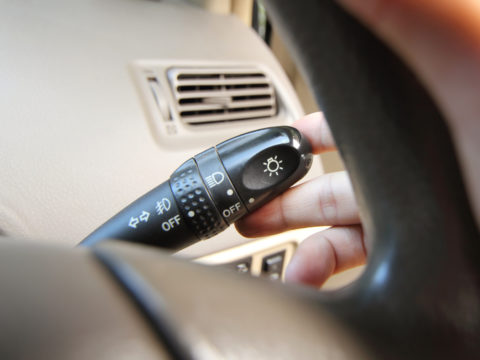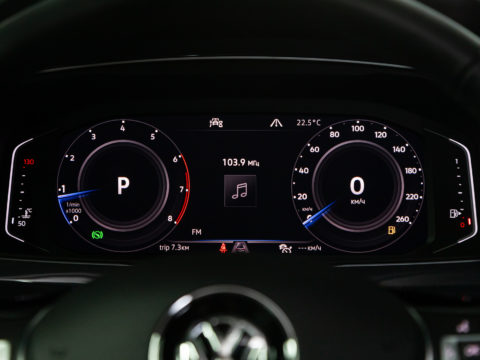Ground straps serve a valuable purpose in keeping your vehicle running smoothly and safely. Here’s everything you need to know about how a ground strap works, why it’s better than a grounding wire, and how to know when you need to replace it.

Contents
What is a ground strap in a car?
A ground strap is a length of braided metal wire terminating in rings on both ends. Like a negative battery cable, it completes your car’s electrical circuit by connecting the battery to the chassis.
Ground straps frequently get confused with ground wires, which serve the same purpose but for the Engine Control Unit and other electrical components in your car.
Less commonly, ground straps may also be used to ground static electricity generated by your car’s tires or your body as you get in and out of your vehicle. In this case, the ground strap hangs from the undercarriage to direct static electricity to the earth.
Typically, ground straps are woven of copper wire due to its high conductivity and shielded with tin to protect them from the elements. Other common grounding strap materials include aluminum and stainless steel, which resist wear and tear on their own.
How does a ground strap work?
A ground strap completes your car’s electrical circuit by providing a return path for current. This circuit is formed between your vehicle’s alternator, battery, engine, and chassis, as well as any other systems that use electricity.
In a circuit, electricity flows from a power source in one direction and comes back along a return path. This return path closes the circuit and without it, the current doesn’t flow.
When you start your car, electricity flows from the positive post of the battery to the engine and all other systems, then returns through the ground strap to the battery’s negative post. A ground strap closes your car’s circuit by providing a return path for electricity stored in your battery.
Where is it located in a car?
Ground straps frequently get confused for grounding wires because your car’s computer and other systems have their own grounding wires under the hood. To keep things clear, the ground strap is commonly referred to as the chassis ground, since it attaches to the chassis.
The ground strap bolts onto the interior chassis or engine block of your vehicle and attaches to the negative post of the car battery. Since the chassis and engine block are metal, they already conduct electricity, so all you need is a ground strap to create a return path.
Ground strap diagram
In the diagram below, you can see where the ground strap attaches to the battery and chassis:
Why a ground strap instead of wire?
Unlike the usual insulated wire or cable, ground straps weave many strands of wire in a thick, wide braid. Their width and number of strands grant them lower resistance, which increases their conductivity and makes for a more reliable flow of current.
Because of their weave, ground straps are also more flexible and durable than insulated wires or cables. For the best long-term investment, it’s better to go with a strap over a wire.
The importance of a ground strap in a car
Besides being strictly necessary to close your car battery’s circuit, a ground strap ensures your battery will operate at a consistent and useful voltage.
It also reduces the likelihood of a short circuit. A short circuit occurs when current flows on an unintended path, leading to unusually high levels of power on wires not meant to carry them. A ground strap encourages current to flow through the chassis along a specific path.
Broken, worn down, or improperly installed ground straps can cause your car’s engine and various electronic systems to malfunction. These problems can also be time-consuming and expensive to troubleshoot, since ground strap issues may first appear to be failures of your car’s battery or engine.

How do I know if my ground strap is bad?
While ground straps are built to stand up to cold, moisture, and the constant vibration of your vehicle, they will break eventually. Look out for the following signs that your ground strap is giving out and needs to be replaced:
Difficulty Starting Engine
A broken, corroded, or incorrectly attached ground strap can lead to difficulty and inconsistency in starting your car’s engine. Variations in power flow through the ground strap may cause your vehicle to stall on ignition or fail to start completely.
You may also hear a distinct clicking noise when you try to start your car. This sound means your starter lacks the power to start the engine, which may be a sign of ground strap failure.
Battery Won’t Charge
Before you assume charge issues indicate a broken battery or alternator, check your ground strap. A corroded strap can interfere with how your alternator charges your battery. This is because your car’s alternator relies on the ground strap to complete the circuit just as much as the rest of your car does.
Low Voltage Readings
Many mechanical issues can cause a decrease in battery voltage, including a faulty ground strap. Voltages below 75% of battery charge are considered low. Most vehicles operate on a 12V battery, where low charge works out to about 12.45 volts.
If you have a newer, 48V battery, that comes out to about 49.74 volts. For a more detailed look at voltage levels for different batteries, Trojan Battery Company provides a useful table on the subject.
Dim or Flickering Lights
The most visible sign of electrical problems, dimming or flickering of your car’s headlights indicates inconsistent power flow. Normally, headlights may flicker during ignition as they compete with other systems for a limited supply of power, but persistent dimming and flickering may hint at ground strap issues.
General Electrical Issues
Broken or worn down ground straps can cause the circuit to open periodically, leading to many kinds of electrical issues in your car as the current fails to consistently flow or fails to flow at a high enough amperage.
Typically, this manifests as electrical systems glitching or failing depending on the current power burden. Any part of your car that depends on ignition to receive power, for example, may experience difficulties as many different systems attempt to operate on insufficient power.
Check out this helpful article from Motor Magazine for more information on electrical troubleshooting and how to determine if your mystery issues originate with your ground strap.
How much does a ground strap cost?
Since ground straps come in a variety of lengths, materials, and ring sizes, prices can vary significantly.
On the cheaper end, expect prices of $5-$15 for a single ground strap. The truly cheap come in at less than $5, and the upper end doesn’t extend beyond $25 for one strap. A pack of ground straps may run closer to $25-$50, depending on quantity and manufacturer.














